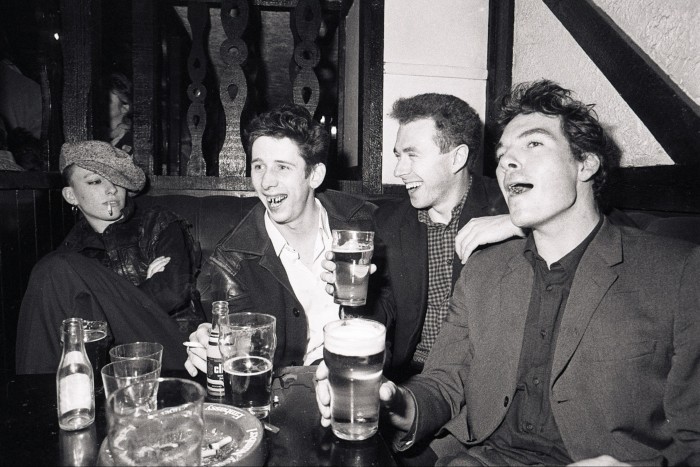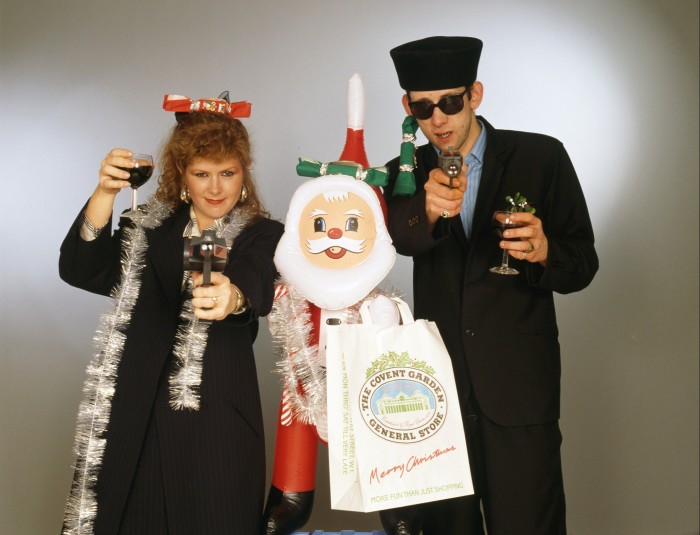
Shane MacGowan, The Pogues’ frontman and punk poet of the Irish diaspora who has died aged 65, found his niche as world music was taking off in the UK in the early 1980s.
“I just thought, ‘If people are being ethnic, I might as well be my own ethnic,’” he said in the 2020 documentary Crock of Gold: A Few Rounds with Shane MacGowan. “I was waiting for somebody else to do it but nobody did. So I did it.”
The Britain-born son of Irish emigrants, best known for his Christmas ballad “Fairytale of New York”, MacGowan ploughed a precocious literary talent into searing, poignant lyrics of love, exile and protest set to music inspired by his early years staying with relatives in Tipperary.
With what his sister Siobhan called his “gritty growl” — and, more often than not, a cigarette and a drink in his hand — he proceeded “to hotwire the mutinous energy of punk with old Irish music”, in the words of his biographer Richard Balls.
Irish President Michael D Higgins led tributes to “one of music’s greatest lyricists”. “The genius of Shane’s contribution includes the fact that his songs capture within them, as Shane would put it, the measure of our dreams,” he said, quoting Pogues ballad “A Rainy Night in Soho”.
“Nobody told the Irish story like Shane,” said Mary Lou McDonald, leader of nationalist opposition party Sinn Féin. “He sang to us of dreams and captured stories of emigration, heartbreak, love and joy.”
Jug-eared with terrible teeth and a decades-long drink and drug habit that led him to the brink of self-destruction, MacGowan was confined to a wheelchair for his last years, his speech a halting slur punctuated by a laugh that sounded like static on a phone line.

He announced a year ago that he was suffering from encephalitis, a brain inflammation, and spent spells in hospital in Dublin. Looking gaunt and frail in a bobble hat and scarf, he was discharged only a week before he died on Thursday.
MacGowan was born on Christmas Day 1957 in Pembury to Therese, a talented singer, and Maurice, who had moved to England for work. Brought up proudly Irish, MacGowan spent happy times as a young child with maternal relatives in a farmhouse that had been a safe house for Irish Republican Army rebels in the 1919-21 Irish war of independence.
There he first tried alcohol and cigarettes — but said none were considered sins — and he seriously contemplated becoming a priest until he was about 11. Later, as a tearaway youth who was expelled from Westminster, a prestigious English public school to which he had won a scholarship, after dealing drugs, he grew to love “the drugs, the drink, the parties . . . the girls — all the things that are hard to get in Ireland”.
Growing up in London amid the Troubles conflict in Northern Ireland, MacGowan said he was “ashamed I didn’t have the guts to join the IRA” — the republican paramilitaries fighting British rule. But in “Streets of Sorrow/Birmingham Six”, he defended the so-called Birmingham Six, who were wrongly jailed for 1974 pub bombings. They were freed in 1991.
His sister said his “chaotic unhappiness” and an appetite for drugs that made her think he “was going to die any minute” plunged him into depression and a spell in a psychiatric hospital, where he turned 18. Shortly after being discharged, he discovered punk band the Sex Pistols — an experience he said “felt like fate”. It pogoed him into a manic, hedonistic musical career.
Bob Geldof of the Irish band The Boomtown Rats once called him “ugly enough to stand out . . . funny enough to be noticed . . . mad enough to fit in”, with lyrics from a “cosmically-laughing, Martini-swilling Celtic Bacchus”.
The Pogues — whose original name, Pogue Mahone, came from the Irish póg mo thóin or “kiss my arse” — put the punk into fast-paced Celtic rhythms. “My crusade was to make Irish music hip again,” MacGowan said.

Frequently drunk on stage — he once said the Pogues performed better sober but it “wasn’t as much fun” — he gained fame with songs including “The Irish Rover”, “Dirty Old Town”, “Streams of Whiskey”, “Thousands are Sailing” and “Fairytale of New York”, his hit with Kirsty MacColl.
The band fired him in 1991 during a world tour because of his excesses. Once again, he spiralled almost out of control; his sister said she had him committed to an institution after being told he had six months to live unless he cleaned up.
In 2000, the late singer Sinéad O’Connor — with whom MacGowan recorded “Haunted” — reported him to the police over his heroin abuse, saying she was “angry to see him destroy himself selfishly in front of those who love him”. But MacGowan said he had no self-destructive impulses or regrets; he kicked heroin and married his partner, Victoria Mary Clarke, in 2018.
Legendary US singer-songwriter Bob Dylan loved “Fairytale”; rock star Bruce Springsteen, who visited MacGowan earlier this year, hailed him as “the man”. Paying tribute to him in 2020, he said: “I truly believe that in a hundred years from now, most of us will be forgotten but I do believe Shane’s music is going to be remembered and sung.”